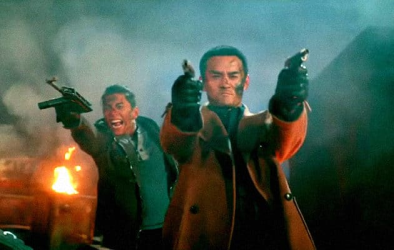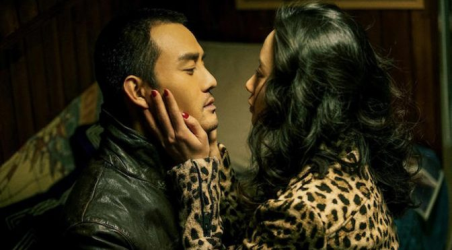The thing about the Koreans and the Hong Kong guys is that they apparently didn’t get the message about what movies are supposed to be about in this modern age. Like saps, they’re making fun, exciting, interesting films about people, without the misanthropy, promiscuity and politics that drain the life from western movies.

But with just as many guns!
I mean, I don’t wanna be a weeb here—and technically, I guess I can’t because I’m not really talking about Japan—but if these movies we’ve been seeing are meant to teach us things, they’re in the general human moral lessons of “treat people well”, “observe your code of honor”, “don’t sell love short no matter how tempting it is”. Even an overtly political movie like 1987: When The Day Comes is less about political hay being made and more about how the events affected various people.
I thought about this because A Better Tomorrow 2018 (a remake of John Woo’s 1986 film A Better Tomorrow) is cut from the same cloth as Hollywood Golden Age films like Dead End and Angels with Dirty Faces. But you’d never see it today from my city. Dig it:
Kai runs a smuggling ring with his sidekick, Ke, whom he loves like a brother. His real brother, though, is Chao, a recent graduate from the police academy. Kai and Ke are just out there having fun, smuggling, when they get invited to a confab with a Japanese drug lord who—

I couldn’t find any pictures of this guy from the front, so you’ll have to take my word for it.
I wanna pause here for a second on the Japanese drug lord: I’ve written before about how, when Japanese appear in Korean movies, something real bad is going to happen. It’s not typically any good when they show up in Chinese films, either, in my experience, but what I delighted in here was the stereotype. Our Japanese gangster is a kimono wearing savage surrounded by the most cliché koto music while sumo wrestlers smack each other in the background. A movie made here with that kind of ham-handed (but not necessarily wrong) approach would probably result in some white liberal arts student trying to set the theater on fire.
—anyway, the drug lord wants to, duh, smuggle drugs and our boys just aren’t into it. They like money, and they don’t really want to hurt any one. When they’re nearly captured by a police ship on the way back, they have a fun little chase and nobody gets hurt.
Classically, this sort of movie ends with a bloody showdown of brother against brother, but here that plot point happens at the end of the first act, when Kai and Ke are betrayed by the Japanese warlord and some of their own gang. Chao ends up shooting him and sending him to jail, which is bad enough, but the baddies come after Kai’s Little Black Book Of Smuggling and in the process attack both Chao and their father.
Kai serves three years and gets out to find that his smuggling ring has been taken over by his crazier crony, Cang, who (of course) is shipping over the Japanese drugs. Cang’s also got his girl strung out on drugs, just to be a jerk. Ke embarked on a spree of vengeance in Japan and ended up a cripple, cleaning rich dudes’ boats. Stung by his blood brother’s rejection, Kai determines to embark on a straight life from here on.

What they do to his girlfriend is a shame.
Which, of course, society does not make easy. Besides only being able to score crap jobs, Chao is convinced big brother hasn’t really gone straight, and dogs the old smuggling ring. Cang approaches Kai to tell him to get Chao to back off, and Kai’s determined to spare his brother the sort of brutality he knows firsthand these guys can dish out.
Well, it all gets out of hand from here, as you might imagine, with bullets flying and things blowing up, and the three brothers forming a bond in an ending that didn’t quite make logical sense but definitely made a Hong-King-John-Woo-action-flick kind of sense.
In other words, it was fun. The Boy really liked it. He had a little trouble getting into it at first because it was not, as he said “a glorious Korea movie” but instead “a glorious China movie”. There is a distinct difference in the aesthetics, emotional content and customs, with HK having a unique style even among the Chinese. (And, I note pointedly, the Chinese do not have the Korean trope of incompetent bureaucrats. The police here are pretty ruthlessly efficient.)
It’s a very guy film. The women are damsels-in-distress, and they don’t fare that well. (This is okay, too.) Our second feature would be a survival/love story by contrast, where the female character is the strong, deep one and the male sort of a shallow figurehead—at least at first.

Guy movie happy ending?
